#barbadostourism
Explore tagged Tumblr posts
Photo

Connecting with travel trade passengers is important and a pleasure at the same time. Great to see you Lisa @lisafitzell of @elegantresorts @thebtmi #barbadostourism (at The House Hotel) https://www.instagram.com/p/CqFxtivOcFQ/?igshid=NGJjMDIxMWI=
3 notes
·
View notes
Text

Travelling to Barbados before Dec 15th? Save 12% off the Story of Rum Tour. incl. a tour of St. Nicholas Abbey and train ride, a tasty local lunch, and rum tasting at Mount Gay Visitor Experience!! Book & save at https://tripgui.de/RumTourDeal
4 notes
·
View notes
Text
Barbados
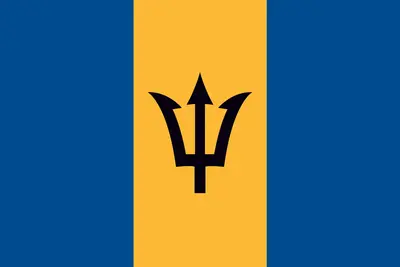
Barbados is a small island nation located in the western part of the North Atlantic Ocean and widely regarded as one of the most beautiful and picturesque nations in the Caribbean. It occupies an area of 432 square kilometers and has a population of approximately 287,000 people as of 2021. This charming island nation boasts of a rich cultural heritage, stunning beaches, luxurious resorts, and diverse flora and fauna. This article provides an overview of this beautiful island nation, covering a range of topics that describe the history, geography, ecology, politics, economy, infrastructure, and culture of Barbados. Over the years, Barbados has grown to become a popular travel destination, attracting millions of tourists from all over the world. Its tropical climate, beautiful beaches, and outdoor activities such as surfing, snorkeling, and hiking make it an ideal location for those looking to escape the hustle and bustle of their daily lives and unwind in a serene and scenic environment. This article is a comprehensive guide to Barbados, and whether you are a first-time visitor or a seasoned traveler, you will find valuable information about the island nation. With sections such as places to visit, recommended activities to do, and best places to stay, this article ensures that you make the most of your stay in Barbados. So, whether you are traveling solo, with family or friends, or on a romantic getaway, Barbados offers something unique for everyone. In the next sections of this article, we take a closer look at various aspects of this Caribbean island nation.
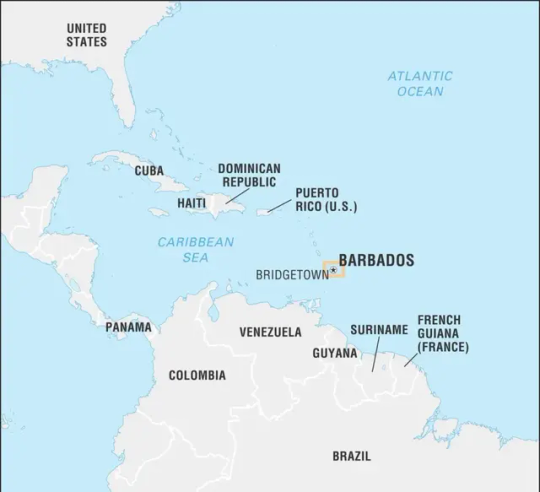
Etymology
Barbados, an island nation located in the Lesser Antilles of the West Indies, has an interesting history and unique features that make it a popular destination for tourists. The country's name, however, has sparked debate and confusion among scholars and historians for centuries. The most widely accepted theory about the origins of Barbados' name is that it comes from the Portuguese phrase "Os Barbados," meaning "the bearded ones." Portuguese explorers first visited Barbados in the 16th century and gave the island its name because of the bearded fig trees that covered the island. The fig trees, which are still present on the island today, have long, hanging, beard-like roots that drape from the branches. Another theory about the origin of Barbados' name is that it comes from the Amerindian word "Barbadosa," meaning "the land of the bearded fig trees." When the British colonized Barbados in the 17th century, they modified the name to "Barbados" to make it easier for their English tongues to pronounce. Regardless of its true origins, Barbados' name has become iconic and synonymous with a unique and beautiful Caribbean nation. The island's name has even inspired naming trends for children, pets, and businesses around the world. If you're interested in learning more about the history, geography, ecology, politics, economy, and culture of Barbados, keep reading this article. We will explore the many facets of this fascinating nation and provide recommendations for places to visit and activities to enjoy while in Barbados.
History
Barbados has a rich and varied history that spans from pre-colonial times to its independence from Britain in 1966. Before Europeans arrived in the late 15th century, the island was inhabited by the Arawak and Carib peoples. The Arawaks were the first to settle on Barbados and developed a strong agricultural economy, growing crops such as cotton, tobacco, and maize. In 1627, the English colonized Barbados, and the new settlers quickly discovered the island's ideal conditions for growing sugarcane. Over the next few centuries, the island became a center of the sugarcane industry, with enslaved Africans brought in to work the plantations. In the late 18th century, the island's sugar exports declined, and the economy shifted towards producing cotton. In 1833, the British government abolished slavery on Barbados and other colonies, forcing the planters to pay wages to their workers. This led to the decline of the plantation system and the rise of a new class of independent smallholders. In 1951, universal adult suffrage was introduced, giving all citizens the right to vote. Barbados' move towards independence began in the 1930s with the rise of political and labor movements. In the 1960s, the island's main political parties began negotiations with the British government, eventually leading to Barbados becoming an independent nation in 1966. The island's first prime minister, Errol Barrow, led the newly independent nation towards economic and social development. Today, visitors to Barbados can learn about the island's history at various museums and historic sites, such as the Barbados Museum and Historical Society, St. Nicholas Abbey, and the Garrison Savannah. The island's rich cultural heritage and diverse population are a testament to its past, and Barbados remains a vibrant and thriving nation.
Geology
Barbados is an island nation situated in the Atlantic Ocean and has a rocky terrain with a flat coral surface covering most of the island. The rocky formation of the island is a result of millions of years of geological activity that has shaped the island's unique landscape and natural resources. The island's geology is a combination of coral limestone, clay, and alluvial soils, which has helped in the creation of the island's rivers and water resources. Barbados' coral limestone formation is the primary base that covers the island's terrain, with different variations found throughout the island. Amongst the different types of coral limestone found on the island are reef limestone, dune limestone, and cliff limestone. The different variations of coral limestone formations have provided the island with a diverse range of rock formations that are both beautiful and unique. Apart from the coral limestone, the island also has natural resources such as clay and alluvial soil, which have played a significant role in shaping the island's ecological makeup. The clay found in Barbados is used in the production of bricks, pottery, and tiles, which are essential construction materials on the island. The alluvial soil, on the other hand, has helped in the growth of crops that serve as a source of food for the island's residents. Barbados has a rich geological history that dates back millions of years. The island was formed due to volcanic activity that took place under the sea, leading to the creation of a coral-covered island. Over time, Barbados has undergone several geological processes that have resulted in the formation of various rock formations and natural resources. Barbados' geology is a vital aspect of the island's history and culture. The various rock formations and natural resources found on the island have shaped the island's ecology and provided essential materials for the island's construction and agricultural industries. Moreover, the geological history of the island has contributed significantly to its unique landscape and natural beauty, making it a must-visit destination for tourists from around the world.
Geography
Barbados, located in the eastern Caribbean, is a small island nation with a unique geography that sets it apart from other islands in the region. The island is only 166 square miles in size, but it boasts a diverse terrain with rolling hills, flat plains, and stunning coastlines. The elevated central ridge of Barbados provides the perfect vantage point for visitors to experience the island’s diverse geological features. The ridge is made up of coral limestone and offers both breathtaking views and an unparalleled geological experience. The island also features multiple caves for exploring, including Harrison’s Cave, which is filled with crystallized limestone formations and natural pools. One of the most iconic features of Barbados is its coastline, which stretches over 60 miles. The island is surrounded by beautiful white sand beaches and clear turquoise waters that offer endless opportunities for swimming, snorkeling, and diving. The west coast of the island is known for its calm waters and luxury resorts, while the south coast is more rugged and offers opportunities for surfing and windsurfing. The eastern coast of Barbados is known for its stunning natural beauty, but the rough waters and strong currents make it dangerous for swimming. Visitors can take in the natural beauty of the island's coastline by taking a walk along the scenic coastal paths and enjoying the breathtaking views. Despite its small size, Barbados is also home to several stunning natural landmarks, such as the Animal Flower Cave, a sea cave that boasts fascinating geological formations and natural pools. The island is also known for its many gullies, which are narrow channels that cut through the landscape and are home to various types of flora and fauna. Barbados' geography has also played a significant role in shaping its culture and history. The island was once covered in dense forests, which were cleared for sugarcane production in the 17th century. Today, the island is a mix of cultivated land, urban areas, and natural reserves. Barbados' unique geography offers visitors the opportunity to experience a diverse range of natural wonders, from stunning coastlines to picturesque gullies and natural landmarks. Whether you're looking to relax on some of the world's most beautiful beaches or explore the island's rugged terrain, Barbados is the perfect destination for travelers of all ages.
Ecology
Barbados is home to a variety of flora and fauna, and its ecological richness is one of the island's major attractions. The island's vegetation is a blend of indigenous, introduced, and cultivated species, which contribute to its vibrant ecology. Barbados' flora includes several species of trees, such as acacias, mahogany, and mango. The island also has an abundance of flowering plants, including orchids, anthuriums, and bougainvillea. However, the vegetation cover on Barbados is not as dense as it used to be, due to decades of deforestation and uncontrolled agriculture. The island's coastal areas are also home to several mangrove communities. They play an important role in protecting the coastline from erosion and provide a habitat for several aquatic species. Barbados is also home to several species of sea turtles that use the island's beaches for nesting. In terms of animal life, Barbados has a rich diversity of wildlife. The island's forests are home to a wide variety of birds, including the endemic Barbados bullfinch and the Antillean crested hummingbird. The island is also home to several species of lizards, including the yellow-bellied anole and the bearded lizard. there are several species of turtles, snakes, and frogs that inhabit the island. Efforts are being made to preserve and protect Barbados' ecology, through initiatives such as the establishment of national parks and conservation areas, as well as reforestation projects. The government of Barbados is also working to promote sustainable tourism practices to minimize the adverse impact of mass tourism on the island's ecology. Barbados' ecology is a significant part of the island's identity. Its flora and fauna are diverse and unique, and protecting them is vital to the sustainability of the island's economy and natural resources. Visitors to Barbados can appreciate the island's ecology through eco-tourism activities, such as bird watching and nature walks.
Biodiversity
Barbados' biodiversity is characterized by an impressive range of plants and animals that live on the island. The country's unique location and diverse landscapes have fostered a fascinating array of ecosystems and wildlife. In terms of plant life, Barbados is known for its beautiful floral landscapes, including vibrant hibiscus flowers, bougainvilleas and anthuriums. The island is also home to various fruit trees, including mangoes, bananas, and guavas. Barbados boasts a range of ecosystems, each with its own unique flora and fauna. For instance, the coral reefs around the island are home to numerous species of colorful fish, sea turtles, and other small marine organisms. These ecosystems are essential for the survival of the island's fishing industry. On the eastern coast of Barbados is the Graeme Hall Nature Sanctuary, a haven for several migratory and endemic bird species. The sanctuary is also home to various reptiles and amphibians, including the green monkey, the only native monkey in the Caribbean. Inland, the island's forests support wildlife such as agoutis, armadillos, and land crabs. The country's national symbol, the flying fish, is known to frequent the waters around Barbados. The waters also house various species of whales and dolphins that are frequent visitors to the island. However, the biodiversity of Barbados is threatened by pollution, habitat loss, and climate change. The government, in collaboration with environmental organizations, has taken measures to mitigate these threats. Barbados has introduced conservation practices, including marine protected areas, to protect its marine life and coral reefs. Barbados' biodiversity is rich and diverse, with numerous ecosystems and wildlife that need protection. Without proper conservation measures, the island's unique and irreplaceable landscapes could face significant losses.
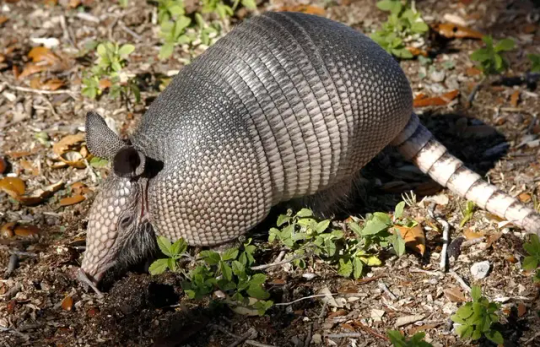
Armadillos
Climate
Barbados enjoys a tropical climate, with warm temperatures year-round. The island's location on the easternmost edge of the Caribbean makes it less prone to hurricanes, though it can still experience some stormy weather during the rainy season from June to November. Temperatures in Barbados typically range from 75°F to 85°F, with high humidity levels. The hottest months are from June to September, while December to February is usually the coolest time of year. The island receives a generous amount of sunshine, with an average of eight hours of sunlight per day throughout the year. Due to its location near the equator, Barbados is outside of the hurricane belt. However, it does occasionally experience the effects of tropical storms and depressions. The hurricane season lasts from June to November, with the peak season occurring from August to October. Barbados' rainy season starts in June and runs until November, with September and October being the wettest months. During this time, the island can experience heavy rainfall and thunderstorms. However, there are still plenty of sunny days in between. the climate in Barbados is ideal for sun-seekers and beach lovers. With warm, sunny days year-round, it's the perfect destination for a relaxing vacation in paradise. However, visitors should always be aware of the possibility of tropical storms and should take appropriate precautions during hurricane season.
Environmental Issues
Barbados has been facing a number of environmental challenges that have been impacting its ecosystems and the livelihoods of its people. One of the most pressing issues is deforestation, which has been exacerbated by the extensive use of wood as fuel for cooking and heating. This has led to soil erosion, loss of biodiversity, and degradation of the island's watersheds. Another major issue facing Barbados is the degradation of the island's coastal ecosystems, which are home to a diverse range of marine species. Overfishing, pollution, and coastal development have all contributed to the decline of these ecosystems in recent years. In addition, climate change is causing rising sea levels, which are threatening to inundate low-lying areas and cause significant damage to infrastructure. Barbados also faces challenges related to solid waste management. The island produces a significant amount of waste each year, much of which is not properly disposed of. This has resulted in pollution of the island's soil, water, and air, as well as the spread of disease. To address these issues, the government of Barbados has implemented a number of policies and initiatives aimed at protecting the environment. These include programs to promote renewable energy, such as the use of solar power and wind turbines, as well as efforts to reduce the amount of waste generated on the island. In addition, Barbados has adopted measures to protect its forests and coastal ecosystems, including the establishment of protected areas and the enforcement of strict regulations on development and fishing activities. The island is also a signatory to international agreements aimed at addressing climate change and other global environmental challenges. Despite these efforts, however, Barbados continues to face significant environmental challenges. The island's small size and limited resources make it particularly vulnerable to the impacts of climate change, pollution, and other threats. Tackling these challenges will require ongoing collaboration between government, civil society, and the private sector, as well as a commitment to sustainable development and environmental stewardship.
Politics
Politics play an important role in the functioning of any country and Barbados is no exception. The country is a parliamentary democracy with the Queen of England as the head of state, represented locally by the Governor-General. The government of Barbados is divided into three independent branches, the legislative, executive, and judiciary, each with its own specific powers and functions. The legislative branch is responsible for drafting and passing legislation. It consists of two houses, the House of Assembly and the Senate. The House of Assembly is made up of 30 members who are elected by the people of Barbados. The Senate comprises 21 members, 12 of whom are appointed by the Governor-General upon the recommendation of the Prime Minister, while the remainder is appointed by the Opposition Leader and Barbados' Social Partnership organizations. The executive branch of the government is responsible for the implementation of laws and policies. It is led by the Prime Minister who is the head of government and is appointed by the Governor-General. The Prime Minister is responsible for appointing other ministers to cabinet positions who assist in running the country. The judiciary is the third branch of government, responsible for the administration of justice. It is headed by the Chief Justice, who is appointed by the Governor-General. The Supreme Court of Barbados is the highest court in the land, and all other courts are subordinate to it. Barbados prides itself in being a well-established democracy and has held regular parliamentary elections since 1961. The political system in Barbados is stable with a two-party system. The two dominant parties are the Democratic Labour Party (DLP) and the Barbados Labour Party (BLP). Both parties have won a share of parliamentary majorities in the past decade. In recent years, political issues in Barbados have been centered on economic challenges. The country has been grappling with high levels of debt coupled with slow economic growth. Read the full article
0 notes
Text

My simple remote podcast setup for Barbados Radio Diaries, to be recorded from Feb. 28 to Mar. 31. I'll be speaking with Barbadians about their amazing island and why more Canadians should be coming here!
1 note
·
View note
Photo
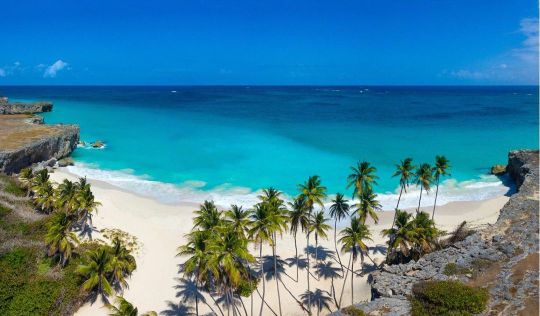
Sol, mar e muita natureza na terra do rum: que tal conhecer Barbados nas férias? #barbados #visitbarbados #barbadostourism #luxurytravelmag #primetour #passagens #viagens #viagensdeluxo #luxo #turismodeluxo #mercadodeluxo #luxury #luxurytravel #passagensaereas #hoteis #resort #resorts #travel #trip #hernonjr #hernonrosa #travelgram #travelgramtravel • • • @hernon @hernonjr @travelgramtravel (em Barbados) https://www.instagram.com/p/Cm-DjDnLAFi/?igshid=NGJjMDIxMWI=
#barbados#visitbarbados#barbadostourism#luxurytravelmag#primetour#passagens#viagens#viagensdeluxo#luxo#turismodeluxo#mercadodeluxo#luxury#luxurytravel#passagensaereas#hoteis#resort#resorts#travel#trip#hernonjr#hernonrosa#travelgram#travelgramtravel
0 notes
Photo

- T H E P R O C E S S - DIARY OF THE STRAY DOGS: The Wounded 2 Written by NIGEL LYNCH (@piratemonkeys76 ) Inks by JUAN CARLOS FRANCISCO (@juancarlos_fco ) Colours by MARIAM YASSER (@mariamyasserart ) #process #manga #comicfan #comics #comicart #beyondpublishingcaribbean #comiccon #caribbean #barbados #barbadostourism #gisbarbados #ncfbarbados #culture #caribbeanculture #scifi #cyberpunk #space https://www.instagram.com/p/Ck8SFXrgd48/?igshid=NGJjMDIxMWI=
#process#manga#comicfan#comics#comicart#beyondpublishingcaribbean#comiccon#caribbean#barbados#barbadostourism#gisbarbados#ncfbarbados#culture#caribbeanculture#scifi#cyberpunk#space
0 notes
Photo
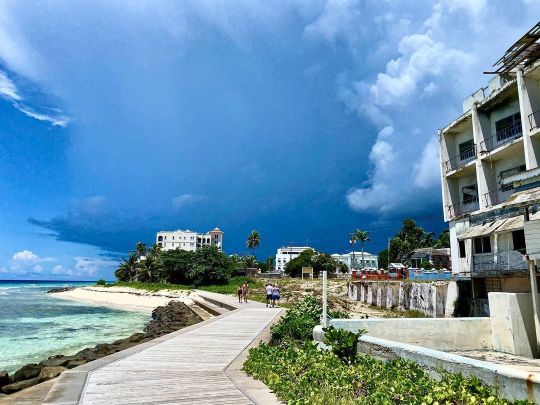
The boardwalk demolition- making way for the future of #barbadostourism @roguesinparadise (at The South Board Walk Hastings Barbados West Indies) https://www.instagram.com/p/Cbnp3njOSJO/?utm_medium=tumblr
0 notes
Photo
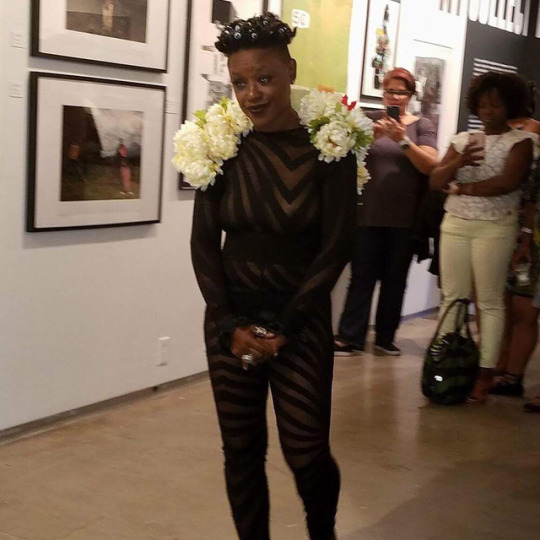
Island and Monster performed at @mocada_museum #mocada #barbadostourism #barbadostourismmarketing #mountgayrum #rushphilanthropic #printbyprint #tamarabest #newyorktimes #sheenarose #performanceart #islandandmonster
#barbadostourism#tamarabest#rushphilanthropic#newyorktimes#sheenarose#mocada#barbadostourismmarketing#performanceart#mountgayrum#islandandmonster#printbyprint
9 notes
·
View notes
Link
0 notes
Photo
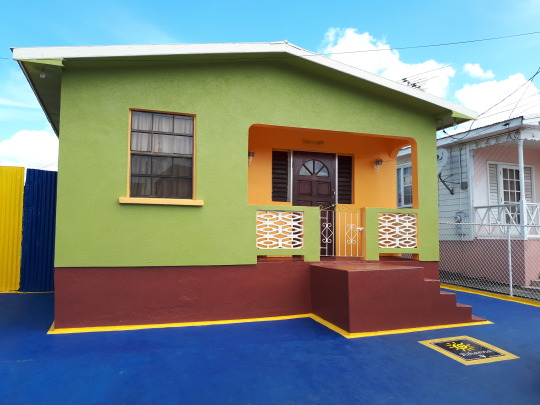
The house where Rihanna grew up before she became famous. Taken in Barbados.
0 notes
Photo

Looking forward to a fruitful collaboration with the new CEO of the Barbados Hotels and Tourism Association (BHTA), Ryan Forde, fostering inclusive public-private tourism partnership, for the benefit of the entire travel and tourism industry in Barbados 🇧🇧. @barbadostravelguide @thebtmi @ryangforde @visitbarbados #barbados #barbadostourism #lovebarbados (at Harrison's Cave Barbados) https://www.instagram.com/p/Cn-awLBJ-s1/?igshid=NGJjMDIxMWI=
1 note
·
View note
Link
0 notes
Link
0 notes
Video
instagram
We welcome you to take a tour of this magical property. Ocean views, peaceful surroundings, outdoor/indoor living. Come and rest, be rejuvenated and feel revived at Oshun Ocean Sanctuary. Link in the bio. #barbadostourism #lovebarbados #holiday #vacation #barbados #airbnb #cropover2018 #oshunoceansanctuary (at Cattlewash, Saint Andrew, Barbados)
0 notes
Photo

My hideaway spot this past weekend... Sitting on the East Coast of Barbados is this secret hideaway Santosha @intimatehotelsb Thank you so much for making the magic happen and for welcoming into your country!!! 🇧🇧 😍 @jumppromotionsbarbados @luckyhorseshoebarbados @canman246 #cropover #travel #Santosha #eastcoast #Barbados #cropover2017 #beautiful #caribbeanhotels #Barbadostourism #pictures #travelblogger #travelphoto #vacation #hotel #missbahamas (at Santosha)
#caribbeanhotels#travel#eastcoast#cropover2017#barbadostourism#travelblogger#missbahamas#travelphoto#barbados#beautiful#cropover#vacation#hotel#santosha#pictures
0 notes
Photo
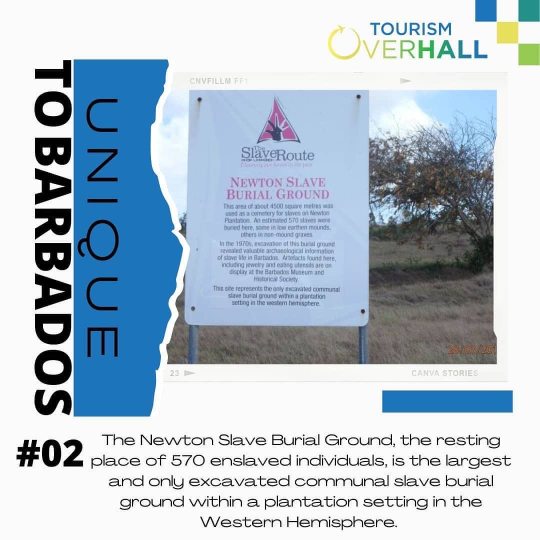
#repost @tourism_overhall the Barbados Slave Code of 1661, legalised slavery on the island. This Slave Code model went on to be adopted in several other British colonies in the Caribbean and the Deep South in the USA and eventually spread even further afield. This is one of several reasons why identifying, developing and preserving the monuments of slavery in Barbados, is a non-negotiable, as it will provide a point of reference for the descendants of the enslaved and a place for learning, reflection, healing, paying homage and closure. Most importantly, it is critical that the world must never, ever forget history’s largest and darkest forced migration and the atrocities humanity is capable of committing against humanity, in order to ensure that the mistakes of the past are never, ever repeated. The toll of slavery and its permutations on todays societies is a serious subject in @roguesinoaradise - @tourism_overhall puts this initiative and monument into its rightful perspective #NewtonSlaveBurialGround #SlaveryinBarbados #BarbadosSlaveCode1661 #Bimrules! #Barbados #Barbadoshistory #Barbadostourism #culturalheritagetourism #uniquetoBarbados #uniquesellingpoints #oneandonly #diversificationanddifferentiation #tourisoverhall (at Barbados) https://www.instagram.com/p/CXva8vTtrVU/?utm_medium=tumblr
#repost#newtonslaveburialground#slaveryinbarbados#barbadosslavecode1661#bimrules#barbados#barbadoshistory#barbadostourism#culturalheritagetourism#uniquetobarbados#uniquesellingpoints#oneandonly#diversificationanddifferentiation#tourisoverhall
0 notes